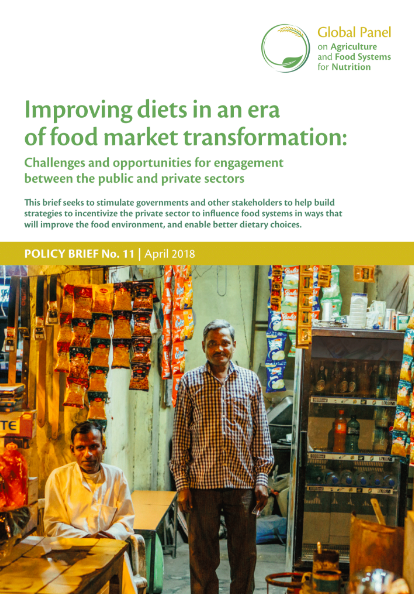Policy brief on engagement between public and private sectors for nutrition
Summary of research1
Location: Global
What we know: Worldwide ‘nutrition transition’, including in low-middle income countries is leading to increasing consumption of ultra-processed foods and unhealthy food choices associated with overweight and obesity.
What this article adds: A Global Panel Policy Brief examines the role of the private sector in shaping diets and provisioning consumer choice in food transformation and food retail, recognising that private sector activities typically focus on individual food products that meet consumer demand, rather than enhance diets. It examines opportunities for governments and stakeholders to use policy to provide incentives for companies to take decisions and risks in supplying nutritious foods and products and to provide an enabling environment that encourages innovation towards this. Public-private partnerships must be formed based on open dialogue and mutual trust, and must address questions in six areas: access to loans and credit for small-to-medium enterprises (SMEs); increasing consumer demand for high-quality and nutritious food products; price incentives to encourage companies to improve quality of food products; minimising risks for SMEs in developing and selling nutritious products; increasing transparency and accountability in engagements between government and the private sector; and improved infrastructure planning.
 Diets are changing rapidly around the world. Some changes, such as improved supply and diversity of foods in low-income settings, have contributed to ongoing global reductions in undernutrition. Other changes, such as rising availability and falling relative costs of ultra-processed foods, have led to unhealthy dietary choices associated with overweight and obesity. This shift in dietary patterns, known as ‘nutrition transition’, coincides with economic development, demographic transition and changes in energy expenditure (i.e. more sedentary lifestyles). In recent decades, the nutrition transition has accelerated amongst LMICs, with a significant shift away from consumption of legumes and coarse grains to consumption of refined grains purchased at informal markets, modern supermarkets and convenience stores, which have penetrated urban Africa and Asia and most of the Middle-East and Latin America (Monteiro and Cannon, 2012).
Diets are changing rapidly around the world. Some changes, such as improved supply and diversity of foods in low-income settings, have contributed to ongoing global reductions in undernutrition. Other changes, such as rising availability and falling relative costs of ultra-processed foods, have led to unhealthy dietary choices associated with overweight and obesity. This shift in dietary patterns, known as ‘nutrition transition’, coincides with economic development, demographic transition and changes in energy expenditure (i.e. more sedentary lifestyles). In recent decades, the nutrition transition has accelerated amongst LMICs, with a significant shift away from consumption of legumes and coarse grains to consumption of refined grains purchased at informal markets, modern supermarkets and convenience stores, which have penetrated urban Africa and Asia and most of the Middle-East and Latin America (Monteiro and Cannon, 2012).
The private sector is involved in all segments of the food system, which encompasses agricultural production, harvesting, processing and packaging, food transformation, marketing and consumer access. It also plays a major role in influencing both the food environment and consumer preferences. In each, businesses can have both positive and negative effect on improving diet quality. A recent Global Panel Policy Brief examines the private sector’s dominant role in shaping diets and provisioning consumer choice in food transformation and food retail. Its purpose is to stimulate governments and stakeholders to build strategies to incentivise the private sector to influence food systems to improve the food environment and enable better dietary choices.
Leaders in almost all LMICs today face a complex policy challenge of how to resolve persisting undernutrition and micronutrient deficiencies while simultaneously preventing the global escalation of overweight and obesity. Urgent action is essential because healthy diets are key to addressing the growing health crisis, and poor-quality diets now threaten the achievement of the Sustainable Development Goals (SDGs). Some LMIC governments are stepping up their efforts to improve diets for all; for example, by focusing on improving consumer knowledge and shaping demand through price and trade policies. However, there are very few successful examples where governments have harnessed the market power of private sector actors to achieve positive gains in nutrition. This is a huge missed opportunity that must be rectified.
Policymakers must be realistic about their own limits in shaping consumer behaviour. Similarly, they need to be pragmatic in seeking to persuade industry partners to play a more active role in improving diets. The food industry already does much to meet the nutritional needs of a rapidly growing global population. However, its activities are typically focused on delivering individual food products, rather than on enhancing diets and larger food systems. There is profit in responding to current consumer demand for convenient, tasty, ultra-processed food products which do not contribute to a high-quality diet.
A policy focus is needed to encourage and enable firms to shift the balance of their activities in favour of products as well as fresh produce which are more nutritious, affordable and accessible to all. The key to this is to establish a common understanding of the critical role of diet quality in nutrition. Circumstances should then inform two broad classes of action: incentives – so that companies have confidence in taking decisions and risks associated with sourcing and supplying nutritious foods and products; and enabling measures – so that the business environment works to encourage rather than inhibit innovative approaches.
Regulation is a powerful tool at the disposal of policymakers for influencing food and beverage companies, although policymakers need to be wary of potential negative side-effects. There are also opportunities and benefits for both public and private interests to move forward in partnership. Appropriate partnerships would enable firms to inform and help shape the design and implementation of policy actions. For this to take place, open dialogue is essential to building trust. The authors of this brief set out six key questions that need to be addressed and resolved as part of any new partnership approach. These are intended to be used as a basis to promote dialogue aimed at achieving more ambitious and effective links between public and private sectors, as follows:
- How can small and medium enterprises (SMEs) access loans to invest in food products which enhance dietary diversity and quality? SMEs have a key role in improving diet quality and nutrition, but lack access to credit and sector-specific loans. Country-specific strategies to boost SME access to finance are needed.
- How can consumer demand for high-quality diets and nutritious food products be created and promoted so that companies have confidence to invest and take risks in delivering more nutritious foods? Both public and private sectors need to step up and work together to find ways to increase access to affordable, high-quality diets and to enable consumers to make more nutritious food choices. Communication can also be a useful tool to increase knowledge and shift attitudes and cultural norms to produce changes in consumption behaviour.
- How should governments incentivise private companies to improve the quality of food products? Price incentives implemented by governments could be used to counterbalance people’s poor eating habits. For example, a cap-and-trade system, with ‘credits’ calculated according to nutritional and other characteristics of foods, could make nutritious food available at reasonable prices, and less nutritious foods available at higher prices.
- How can risks associated with developing, producing and selling more nutritious foods be minimised? There are several potential risks for companies wishing to invest in research and development or retail of nutritious foods, such as failure to generate sufficient demand; fluctuations in economic conditions, commodity prices, interest and exchange rates; political risks; regulatory changes; and technology and operational risks. To encourage investment, suitable insurance products need to be designed and made available, particularly for SMEs in LMICs.
- How can governments ensure that engagement with for-profit companies to promote universal access to healthy diets is underpinned by core principles of transparency and accountability? Currently, there is a significant lack of trust and transparency relating to food sector operations. The Access to Nutrition Index monitors this for major food and beverage companies, but additional mechanisms are needed which can cover other actors in the food system, such as farmers, entrepreneurs and local companies. There is also a need for better data collection and indicators of the outcomes of government efforts to create enabling environments that promote nutritious foods and which track businesses that want to drive better affordability and accessibility to healthy diets.
- How can infrastructure planning be better geared toward reducing food losses and promoting year-round access to enhanced diets? One of the major constraints to higher-quality diets is unreliable or lacking supporting infrastructure, such as remote roads, electrical and water-grid networks. In low-income countries, where food loss is a major issue, investing in better infrastructure, particularly cooling and storage facilities, is paramount. Recognising that public funds for such projects may be limited in many countries, governments should encourage private investment and public-private partnerships.
The authors conclude that, while much of the problem of poor diets arises in the private domains of business and consumer choice, the ‘costs’ are mainly borne by society and public health budgets. Therefore, partnerships among governments, the food industry and consumers are essential going forward. It will be more profitable for industry and more cost-effective for governments to work together towards enabling better diets than to be in conflict over what must become common goals. Both sides must find ways to work together at a new and much more ambitious level in order to mitigate the enormous health burden associated with poor diets that already affect one in three of the global population.
Endnote
1Global Panel. 2018. Improving diets in an era of food market transformation: Challenges and opportunities for engagement between the public and private sectors. Policy Brief No. 11. London, UK: Global Panel on Agriculture and Food Systems for Nutrition. http://glopan.org/sites/default/files/Downloads/GlobalPanelPrivateSectorBrief.pdf
References
Monteiro CA and Cannon G. 2012. The Impact of Transnational “Big Food” Companies on the South: A View from Brazil. PLoS Med. 2012;9(7):e1001252.


